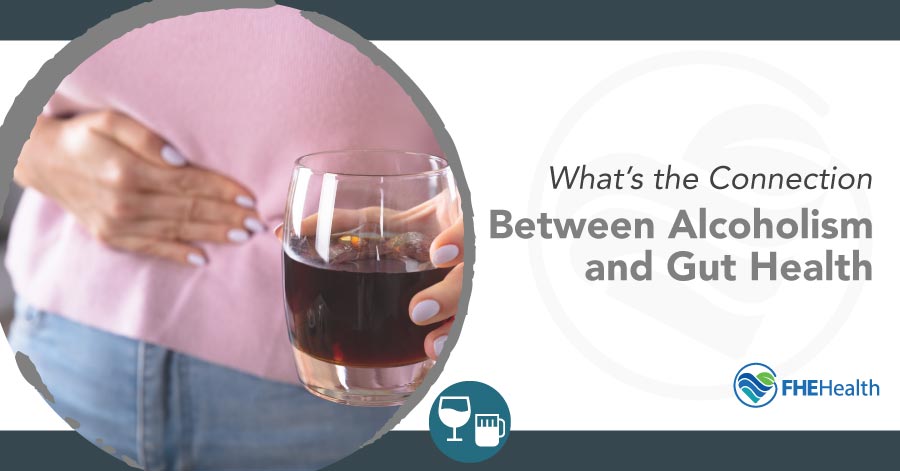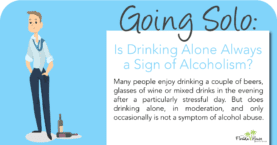
Today many people are interested in improving gut health, having learned that the gut or digestive system impacts physical and mental wellness also. As a result, the desire to eat better and find products that can help the gut work optimally continues to grow. Numerous products are available to help heal gut issues, including probiotics and prebiotic supplements, and people spend billions on them each year. However, one area in which people may know less about is the often-overlooked link between alcohol intake and gut health.
The Brain-Gut Connection
People often talk about having “gut” feelings when they must make a life-changing decision, or if they have a fear something serious is about to happen. Science tells us that those “butterflies” in the stomach that signal apprehension, excitement, or fear come from the second brain—the gut. The gut is called the enteric nervous system. Millions of nerve cells in the digestive tract, from the esophagus to the rectum, make up the ENS and while it does not think or make decisions, the ENS has a connection to the brain.
Research indicates that problems in the gut can impact an individual’s mood. Likewise, what happens in the brain can affect the gut. Given the close connection between the brain and gut, alcohol or substances that alter the brain can affect the gut. Alcohol addiction can damage the gut microbiome and lead to serious physical illness.
What Is Gut Health?
The microbes’ genetic material, including bacteria, fungi, protozoa, and viruses living inside and on the body, is collectively known as the microbiome. People assume that bacteria and other microbes are disease-causing organisms that are bad for the body. However, there are beneficial bacteria that fight off harmful bacteria. The microbiome plays a role in wellness by defending the body against diseases and infections.
Trillions of bacterial microbes exist in the gut, and most aid in fighting disease. In many people, these microbes weigh about five pounds and work as an additional organ in the body. Experts indicate that the gut is home to 70 percent of the immune system, with gut bacteria and the immune system working in tandem. However, when the microbiome is off balance, individuals can begin to experience health issues.
Alcohol and Gut Health
There is a connection between alcohol use and gut health. Alcoholics and others who drink to excess may be unaware of the risk to the gut. Heavy drinking can challenge the gut’s microbiome in several ways.
What Kind of Effect Does Alcohol Have on Gut Health?
Heavy alcohol consumption puts gut health at risk. Alcohol kills beneficial bacteria in the gut. The loss of good bacteria leaves the gut vulnerable to conditions that can lead to long-term illness when an individual continues to heavily drink and does not get treatment for gut issues.
Can Alcohol Cause Intestinal Inflammation?
The answer is yes. Drinking not only causes intestinal inflammation, but also other issues in the gut. For example, alcohol relaxes the esophageal sphincter, causing acid reflux, where stomach acid flows back into the esophagus.
Long-Term Damage from Alcohol on Gut Health
Frequent heavy drinking can cause damage to the esophagus and, in some cases, leads to esophageal cancer. Excessive drinking can also lead to gastritis or inflammation of the stomach lining. Alcohol destroys beneficial bacteria in the gut and depletes the gut of nutrients such as vitamin B and zinc. Frequent and heavy alcohol use can increase the harmful bacteria in the gut. When bad bacteria outnumber beneficial bacteria, alcohol gut inflammation can be problematic. The bacterial imbalance and lack of zinc can also cause a leaky gut, a condition in which alcohol alters the permeability of the gut lining. As a result, bacteria and toxins can enter the bloodstream through openings in the intestine.
Additional Effects of Alcohol on the Digestive System
The effects of alcohol on the function of the digestive system extend to the liver and pancreas. Excessive alcohol consumption can cause alcohol fatty liver, cirrhosis, cancer, and pancreatitis. An unhealthy gut may also play a role in an individual developing autoimmune conditions like diabetes, multiple sclerosis, obesity, and rheumatoid arthritis.
Since the gut affects mood, an unhealthy gut or enteric nervous system can send signals to the brain, leading to anxiety, depression, and stress. Some research shows that the inflammation experienced by individuals with unhealthy guts can increase alcohol cravings. When a person addicted to alcohol or other substances experiences these feelings, the result can be a vicious cycle of using substances to feel better. Continuous use can lead to serious illness. The good news is that the addicted individual who stops drinking or using drugs and begins consuming healthy foods can improve their gut health.
Is Recovery Possible After Damage to the Digestive System from Alcohol?
For individuals struggling with addiction, healing the gut starts with quitting drinking or other drugs. For most people, that means entering a rehab program that offers a medically supervised detox. Ridding the body of alcohol and drugs and eating foods that heal the gut can improve overall health. As the gut heals, the individual can absorb healthy nutrients and fight infections better. Drug or alcohol cravings can then over time decrease, which helps with progress toward recovery.
Eating to Heal the Gut
Eating various foods to give the body the nutrients required to improve gut health, build lean muscles, and maintain a healthy weight is essential. Prebiotics and probiotics help keep the gut healthy and boost the immune system.
Prebiotics come from fiber in foods like fruits, grains, nuts, legumes, and vegetables. Asparagus, bananas, onions, and soybeans are some foods in the prebiotic group. Fiber-rich foods can also promote healthy weight since they are filling. They can also have a positive impact on the heart. Nutrition experts recommend getting at least 25-30 grams of fiber daily.
Probiotics are good bacteria or live microorganisms found in foods and probiotic supplements. They help keep the gut healthy by promoting the presence of beneficial bacteria and boosting immunity. Yogurt, soy beverages, and fermented foods like kimchi and sauerkraut that have not been heat-treated are examples of probiotics.
Prebiotic and probiotic supplements come in different forms, including capsules, gummies, liquids, and powders. However, nutrition experts recommend getting prebiotics and probiotics by consuming a healthy diet. Read more about natural supplements in common foods.
Seek Help if You are Dealing with Digestive System Issues Related to Alcohol
If you or someone you care about has been struggling with addiction and poor digestive health, you may be looking for a fresh start and a better quality of life. It is possible to recover from addiction and improve overall health by quitting substances and adopting a lifestyle that includes healthy eating and exercise. There’s no need to face these issues alone. A quality rehab center like FHE Health can work with you to develop a treatment plan to get you on a path to recovery and improved health.









